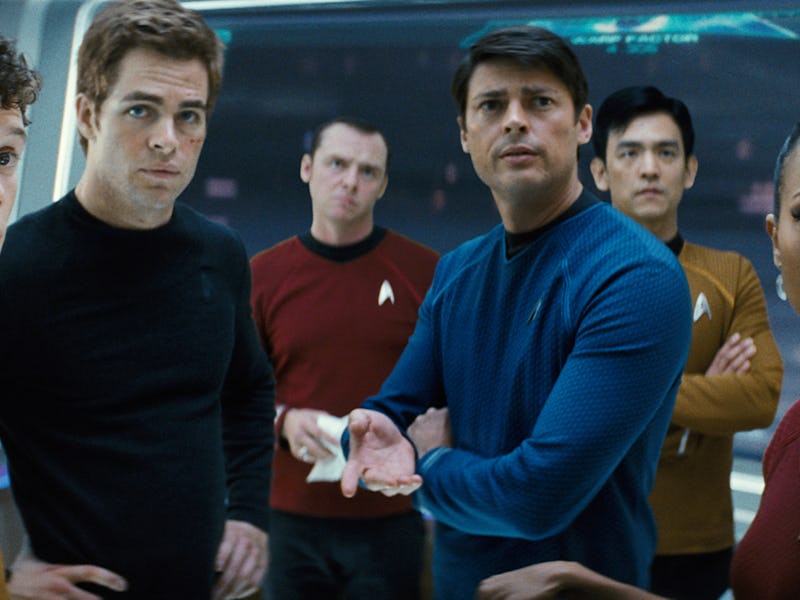The Multiverse is Everywhere Thanks to a Groundbreaking Sci-Fi Reboot
Complicated timelines and alternate universes? No problem.

Imagine there’s no multiverse. Before 2009, that was an easy request. Although comic books and sci-fi TV had delved into parallel worlds for decades, the number of mainstream movies trafficking in alternate timelines was vanishingly small. Even when there were splits in spacetime, like in Back to the Future II, those were generally resolved by story’s end. But that all changed when the little sci-fi franchise that could, Star Trek, came roaring back onto the big screen. This J.J. Abrams flick gets a lot of credit for revitalizing blockbusters, sci-fi, and the Trek franchise, but it doesn’t get credit for normalizing the multiverse in mainstream movies.
What’s so fascinating about watching Star Trek now that it’s back on Netflix is realizing how far it kicked open the multiverse door for mainstream Hollywood. Star Trek takes place in an alternate timeline, one parallel to the “Prime” Star Trek canon but also dependent on it thanks to time travel. In the opening, an angry Romulan named Nero (Eric Bana) accidentally travels back in time and destroys a Starfleet ship in 2233. This ship was the USS Kelvin, with George Kirk (Chris Hemsworth) as its first officer. Kirk dies defending the Kelvin’s evacuees, and baby James T. Kirk is born in space on a shuttle. Later, Spock (Zachary Quinto) makes it clear that “whatever our lives might have been, if the time continuum was disrupted, our destinies have changed.”
In 1985, the DC Comics universe rebooted with Crisis On Infinite Earths, which effectively reconciled the many timelines and parallel realities of various comic book titles into a new continuity. What Star Trek did was essentially an Infinite Crisis moment for the Trek timeline. That’s significant; previously, mainstream blockbusters almost never left their heroes in an altered timeline.
In terms of conflicting timelines in mainstream sci-fi, the Back to the Future trilogy is the easiest reference point. In Back to the Future, Marty altered his present somewhat, but the film’s status quo was always in flux. The entire premise of Back to the Future II was about an ongoing alternate timeline created by Old Biff going to the past. Star Trek 2009 not only had Nero go into the past and change the present, but Old Spock (Leonard Nimoy) too.
The Kelvin is attacked.
What makes Star Trek a radical departure is simple: the ending keeps the alternate timeline intact, and everyone, including Old Spock, continues to live there. This would be like if Back to the Future II continued in that alternate timeline, and Michael J. Fox was no longer playing Marty. Even Star Trek’s creators noted the parallels. On Star Trek’s soundtrack, composer Michael Giacchino named a track “Does It Still Mcfly?” in reference to the spaceship that brought Spock to the past.
The idea that Star Trek created a new continuity dependent on old continuity was somewhat radical for the time, even if it’s commonplace now. Even within existing Star Trek films and television, nothing like this had been attempted. Oh, there’s time travel, and plenty of it, but the status quo is always reset, and the characters continue on in their own, previously established timeline.
James T. Kirk (Chris Pine) takes command of the Enterprise.
Star Trek threw that out the window. The planet Vulcan was destroyed, and there was no going back. Suddenly the destinies of established characters could end up very different than they did in The Original Series or The Next Generation. Although this version of Star Trek was only explored in two film sequels, the IDW comic book series reimagined various TOS episodes with the reboot crew from 2011 to 2015, with excellent results.
As Marvel, DC, and seemingly everyone else continue to merge dimensions, Star Trek remains a unique achievement. Its approach to the multiverse was elegant, in that a casual viewer understood it right away. But relative to its own canon it was also, appropriately, bold.
Star Trek is streaming on Netflix.